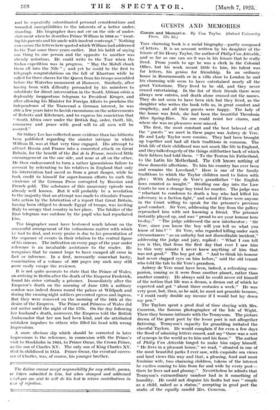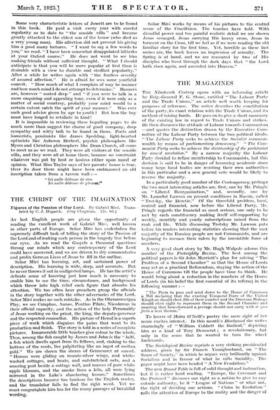GUESTS AND MEMORIES
Tins charming book is a social biography—partly composed of letters. It is an account written by his daughter of the
leisure of Sir Henry Taylor, the author of Philip Van Artemide,
and so far as one can see it was in his leisure that he really lived. From youth to age he was a clerk in the Colonial Office, but his work meant little to him, his talent was for letters, his genius for friendship. In an ordinary house in Bournemouth or in a villa close to London he and his charming wife seem to have entertained nearly all the great Victorians. They lived to be old, and they never ceased entertaining. In the list of their friends there were
always new entries, and death alone crossed out the names. They do not seem to have been rich but they lived, as the daughter who writes the book tells us, in great comfort and simplicity, and all their guests were happy. The lady of the-house was Irish, she had been the beautiful Theodosia Alice Spring-Rice. No one could resist her charm, and where she was no pleasures were missed.
The first, the most constant and the best beloved of all the " guests " we meet in these pages was Aubrey de Vere. He and Lady Taylor were cousins. They had been brought up together and had all their traditions in common. The Irish life of their childhood was not much like life in England, and they talked eagerly of the things still further back of which their fathers had told them. ".To the Teuton his Fatherland, to the Latin his Motherland. The Celt knows nothing of these domestic affections. To him his country has ever been and remains the Loveland." Here is one of the family traditions to which the Taylor children used to listen with glee : With Aubrey de Vere's grandfather " the English laws counted as naught." Strolling one day into the Law Courts he saw a strange boy tried for murder. The judge was " reluctant to condemn to death a boy who had killed his adversary in a faction fight," and asked if there were anyone in the Court willing to speak for the prisoner's previous good conduct. Sir Vere, addressing the boy from the gallery reproached him with not knowing a friend. The prisoner instantly played up, and was " proud to see your honour here to-day." " The judge addressed the new interlocutor : ' Sir Vere, since you know the boy will you tell us what you know of him ?' " Sir Vere, who regarded killing under such circumstances " as an unlucky but not discreditable incident," addressing the judge and jury, replied : What I can tell you is this, that from the first day that ever I saw him to this very minute I never knew anything of him that was not good." The boy got off. " And to think his honour had never clapped eyes on him before," said the old tenant who told the tale to Sir Vere's grandson.
Aubrey de Vere must have been, indeed, a refreshing com- panion, coming as it were from another planet, rather than another country. He always said he could never rid himself of the notion that life was a dream, a dream out of which he expected and got " about three ecstasies a week." He was very poor, but, then, as he said, he must not grumble because, " I could easily double my income if I would but lay down my pen."
The Taylors spent a good deal of time staying with Mrs. Cameron, the famous photographer of the Isle of Wight. There they became intimate with the Tennysons. The picture drawn of the great poet by the lesser poet is not altogether flattering. Tennyson's capacity for grumbling irritated the cheerful Taylors. He would complain if for even a few days the flood of admiring letters ceased, and say "there was a sort of syncope in the world as to him and his fame." The author of Philip Van Artevelde longed to make him enjoy himself. " He lives in a pleasant house," we read, " situated in one of the most beautiful parks I•ever saw, with exquisite sea views and land views this way and that, a pleasing, fond and most feminine wife, two charming children, tokens of the interest he excites coming to him from far and wide by every post— there he lives sad and gloomy." Nevertheless he admits that Tennyson's extraordinary candour had in it something of humility. He could not disguise his faults but was " simple as a child, naked as a statue," accepting in good part the
snubs of the equally- candid Mrs. Cameron. _ Some very characteristic letters of Jowett are to be found in this book. He paid a visit every year with careful regularity as to date to "the seaside villa " and became greatly attached to the eldest son of the house (who died as a very young man). His affection did not prevent his giving him a good many lectures. " I want to say a few words to you," we read. " 1 have been somewhat disappointed hitherto at your Oxford course." He does not want to see him making friends without sufficient thought. " What I should anticipate is that you will be more popular at first than is desirable with a view to durable and stedfast popularity." After a while he writes again with " the fearless severity of assured affection." He is afraid he sees some youthful -conceit. " How much of what I complain.of may be manner and how much mind I do not attempt.to determine." Manners are, however ".seated deep " and if you were to talk in a more enquiring and appealing tone, even if it were only as a matter of social courtesy, probably your mind would to a certain extent catch the spirit of your manner." Was ever such good advice given by age to youth'? But how the boy must have longed to retaliate in kind
It is impossible in reviewing these beguiling pages to do much more than suggest the charm of good company, deep sympathy -and witty talk to be found in them. Poets and humorists, pessimists like James Spedding, light-hearted optimists like Auberon Herbert, psychic philosophers like Myers and Christian philosophers like Dean'Church, all come to meet us as we read. They were all visitors at the seaside villa, and they were all at home there, because no constraint whatever was put by host or hostess .either upon mood or opinion. What Miss Taylor says of her parents' house is true. Over its door there might have been emblazoned an old inscription taken from a tavern -wall :— ‘‘ lei nulls defense de rire Ici.unite defense de pleurae'



























































 Previous page
Previous page